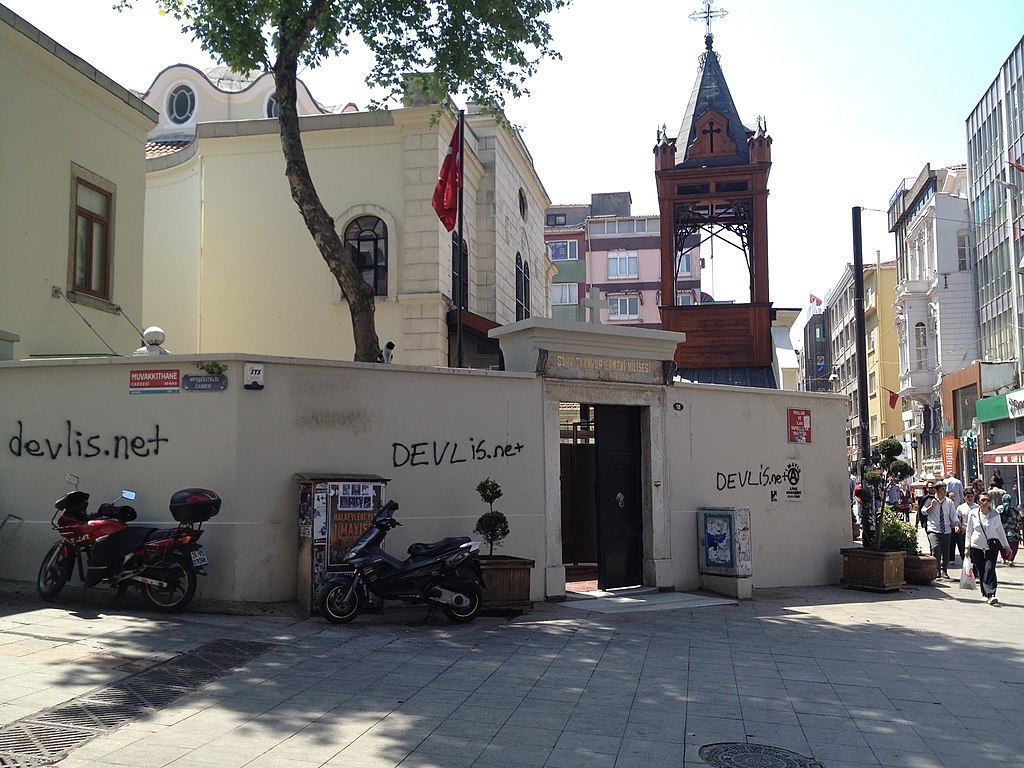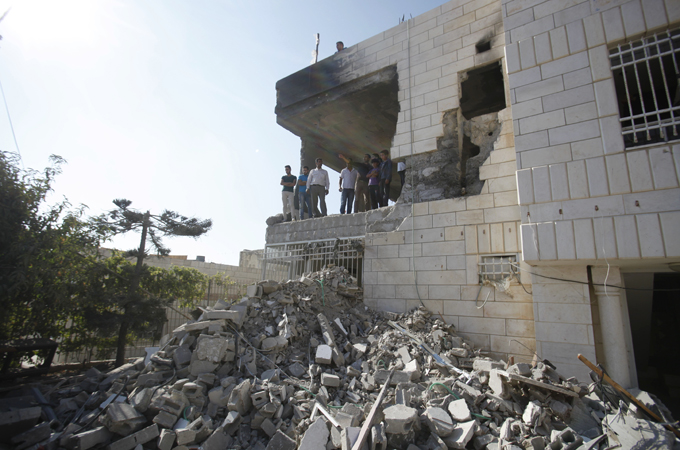
- “Allah, kill the despicable Christians. Allah, kill each and every last one of them….” — 16-year-old Muslim son of an Islamic cleric living in Belgium.”ISIS is not the problem… They shaved my head, they put my head in freezing cold water and then into boiling hot water. They burned their cigarettes on me, they electrocuted me.” — Majed el-Shafie, imprisoned and tortured in Egypt for converting to Christianity.
-
- A Christian girl faces death threats if she does not return to her Muslim abductor who forcibly converted her to Islam. The family of a Christian girl who was kidnapped, raped, forced to convert to Islam, and then forcibly married to a Muslim are now under threat if they refuse to hand back their daughter to her captors.
Islamic hate for Christians was on display throughout the month of August. Shortly after an 80-year-old Catholic priest in France was slaughtered by Muslims who stormed his church during mass, the 16-year-old Muslim son of an Islamic cleric living in Belgium made a video and posted it on social media. In the video, he appears walking along the main street of the Belgian city of Verviers during Ramadan while making prayers to Allah, which include: “Allah, kill the despicable Christians. Allah, kill each and every last one of them….” According to Immigration Minister Theo Francken:
“It’s obvious that his father, the imam, is promoting such ideas not just to fighters to join the battle in Syria, but also to his own children. The young man who appears in the video reflects the father’s views, and I understand and empathize with the great concern that city residents have over this.”
A deportation order was last reported as pending a court appeal.
Similarly, in the August edition of Dabiq, ISIS’s propaganda magazine, the jihadi organization urged Muslims to destroy the “arrogant Christian disbelievers” and urged them to “pray for Allah’s curse to be upon the liars.” ISIS also threatened Christians to “break the cross.” Those who do and convert to Islam will “enter the Gardens of Paradise,” and those who reject Islam and cling to the cross will die in a “futile” war against ISIS.
As if the Christians of Nigeria were not persecuted enough by Muslim groups, Boko Haram’s new leader, known for killing nonconformist Muslims as well, announced that Christians are now its number one and primary target, and that Boko Haram will continue to “bomb churches and kill Christians while ending attacks on mosques and markets used by ordinary Muslims.” Abu Musab al-Barnawi, the new leader, also spoke of “booby-trapping and blowing up every church that we are able to reach, and killing all of those who we find from the citizens of the Cross.”

Abu Musab al-Barnawi (shown seated), the new leader of Nigeria’s Islamist group Boko Haram, announced that Christians are now the terrorist group’s number one target, and that they will continue to “bomb churches and kill Christians… booby-trapping and blowing up every church that we are able to reach, and killing all of those who we find from the citizens of the Cross.”
|
In Egypt, after Muhammad Hegazi’s nine-year long battle with authorities, Islam’s honor was restored, although in a way apparently held suspect by many rights activists there. His battle began when he asked his religion to be changed to Christianity on his Egyptian ID card, and ended with his being arrested and tortured for years. Hegazi made a brief video announcing his return to Islam and praising Muhammad, adding “I say this out of my complete free will. I am not being held by any agency, nor am I under any pressure of any kind.”
Another Egyptian, Majed el-Shafie, also imprisoned and tortured for apostatizing years ago in Egypt, wanted the world to know that, “ISIS is not the problem.” As proof, he recounted his experiences — at the hands of Egyptian authorities:
“They shaved my head, they put my head in freezing cold water and then into boiling hot water. They burned their cigarettes on me, they electrocuted me. They cut me and put salt in my wounds. I still wake with nightmares about it, even now 20 years on.”
The remainder of August’s roundup of Muslim persecution of Christians — not all of which was committed by ISIS — includes, but is not limited to, the following:
Muslim Slaughter of Christians
Nigeria: Muslim Fulani herdsmen, believed to be connected to the Islamic terrorist group, Boko Haram, increased their raids on Christian-majority villages:
- Between August 1-3, they killed 13 Christians, burned Christian homes and churches, and displaced countless survivors during raids conducted in separate Christian-majority villages.
- On August 13, Muslim shepherds killed another seven Christians during another raid. Some of the victims were shot; others were slaughtered with machetes.
- On August 16, Muslim herdsmen attacked still another Christian-majority village and slaughtered ten people.
- On August 25, a group of at least 50 Muslim herdsmen conducted a night raid into another Christian-majority village. Among their victims was a Christian woman six months pregnant, whose stomach had been ripped open.
According to one report,
Local Christian leaders were pleading with the Nigerian government to provide appropriate security measures in light of the crisis, which the state has so far left unaddressed. Since 2001, Fulani attacks on Christian-majority farming settlements across Nigeria’s central “Middle-Belt” have grown increasingly violent; victims face their towns being wiped off the map. Fulani herdsmen have murdered tens of thousands of Christians, and have amassed a body count larger than Boko Haram has inflicted; attacks expand farther into Northwest and Southeast Nigeria, while the Nigerian government largely ignores the issue…
This indifference reportedly reaches to the president of Nigeria, Muhammadu Buhari. According to a prominent Nigerian thinker and politician, Femi Fani-Kayode, despite the increasing violence against Christians, “the Muslim president has only awarded the murderers with impunity rather than justice and has staffed his government with Islamic officials, while doing essentially nothing to give the nation’s Christians, who make up half the population, due representation.”
Uganda: A group of Muslims murdered Pastor Robert Bakulubanywa, 38, as he was returning home after a Sunday evening at his church. A group of Muslims — reportedly angry with him for evangelizing to Muslims and refusing to sell them land — surrounded him, tied him up, and sliced him to death with a sword.
Democratic Republic of Congo: Muslim militants from the Allied Democratic Forces for the Liberation of Uganda gathered and tied up between 36 and 50 Christians, before hacking them to death. In recent years, the “liberation” front has targeted Christians with violence, abducting people, looting Christian villages, and destroying churches, although most Western media downplay the religious motives of the rebels.
Muslim Attacks on Christian Churches
Indonesia: A teenage Muslim sitting among Christian worshippers during a Catholic church Sunday mass service suddenly went into jihad mode: he attacked the 60-year-old priest with an axe and tried to set off explosives, which could have killed hundreds of worshipers in the packed church. The bomb failed to go off properly and the 18-year-old Islamic terrorist was apprehended.
United States: In Riverside, California, Muslims in a car, who were repeatedly screaming “Allahu akbar!” through a bullhorn, terrorized St. Andrew Orthodox Church during worship service, “as the unnerved parents drew their infants close and exchanged worried glances,” said the report. Some witnesses told police it looked as if one of the three men, in the green Honda Civic, had been taking surveillance pictures of the church.
France: During a mass held for Father Jacques Hamel — the 80-year-old priest slaughtered days earlier — at the St. George Church in Vivonne (Vienne), a small town of 4,000 inhabitants, the priest informed the congregation that the church had been vandalized: “the light of the tabernacle of the Real Presence had disappeared or had been stolen, and placed on the altar was a photo of the Nice terrorist, the Islamist Mohamed Lahouaiej Bouhlel.”
Iran: Authorities arrested 11 Christians during a raid on an house-church in the city of Isfahan. Books and other Christian literature were confiscated. According to the report, there was no further information about the status of the detainees.
Turkey: After giving previous permission, authorities banned Orthodox Christian liturgy from being held at a historic monastery. According to the report:
The doors of the Sumela Monastery reopened in June 2010, after 88 years. The Turkish government had given permission to the Ecumenical Patriarchate to have a patriarchal liturgy for the Feast of the Assumption every year. That permission has been suddenly revoked, perhaps permanently.”
Sudan: Claiming that it was built illegally, local Muslim authorities issued a demolition notice to yet another church. The congregation was given one week to clear out or else further legal procedures would be taken, including forcing the church to pay the demolishing costs. The church was built on the land in 1976, a considerable time before the National Islamic Front seized power in Sudan through a military coup in 1989 — so how could it be illegal, argue church activists. Countless churches that once stood in Sudan for decades have met the same fate in recent times.
Pakistan: Christians accused the government of Gujrat of intentionally flooding a 130-year-old church with sewage. According to the report:
“Local Christians managed to cut the flow of sewerage after hours of skirmish efforts…. Agitated Christians claimed that the flow of the sewerage was maneuvered towards the church in order to prevent it from flooding neighboring Gujrat Gymkhana. The waste water swamped the flooring and carpets of the church.”
Muslim Attacks on Christian Apostates, Blasphemers, and Preachers
Algeria: A Muslim convert to Christianity was sentenced to five years in prison for saying on social media that the light of Jesus will outshine Islam and its prophet Muhammad, which the court ruled was “blasphemous.” According to his son, who accompanied the apostate during his hearing:
“The court sentenced my father to the maximum sentence! …. [M]y father was expressing his ideas and spread his political views on social networks as it has always done elsewhere. It is an attack on freedom of expression because, in my opinion, everything is subject to criticism, even religions.”
Nigeria: After two university students got into a verbal argument, the Muslim student accused the Christian of insulting the Muslim prophet Muhammad. Soon, a mob of Muslims formed and said the Christian must die; they savagely beat and nearly killed him. He only survived “because a fellow Christian intervened to rush him to the hospital with the help of a compassionate Muslim who volunteered his car to carry the victim.” On the following day, mobs of Muslims rioted and vandalized Christian campuses and churches. According to a local source:
“They went to ECWA Church, Living Church, and Anglican Church. They vandalized the Anglican Church pastorium, destroying electronics and other property. I heard they also burnt down the home of the rescue volunteer Muslim man (who assisted the attacked Christian student to the hospital), trapping and killing eight persons inside who, sadly, happened to be Muslims also.”
Separately, a Muslim man sought to divorce his wife of 24 years, after he discovered that she secretly converted to Christianity. The man stated that he cannot tolerate any other religion in his home except for Islam. The 50-year-old woman “broke down in tears while on her knees begging her estranged husband, Jamiu Adewunmi, not to divorce her.” Addressing the court, she said: “Please court; help me beg him, where will I get a man at my age to marry me if my husband divorces me?”
Pakistan: A Christian girl named Asma faces death threats if she does not return to her Muslim abductor. The man, a powerful Muslim neighbor, kidnapped the girl, raped her, forced her to convert to Islam, and then forcibly married her and renamed her “Aisha,” after the Islamic prophet’s young wife. Several months later, Asma escaped and returned to her family, who are now under threat if they refuse to hand back their daughter to her captor. Local Muslim clerics claimed that Asma has re-converted to Christianity, and so is now an apostate and should be killed unless she returns to her husband and new faith.
Uganda: Eight children, ages 9 to 16, from four families of Islamic and pagan backgrounds, took refuge with Christians after their parents and other community members beat and disowned them for leaving Islam and animism for Christianity. Through the ordeal, the church in which they were able to seek refuge has also come under threat of destruction and violence by the local Muslim population. “Your church activities will not be tolerated in this area,” one Muslim informed the pastor. “If you do not leave our village, then we shall soon come for your life.” Separately, a Christian high school student received a serious head injury by the Muslim father of a young woman whom he proselytized.
Muslim Discrimination against and Abuse of Christians
Saudi Arabia: According to an Arabic-language news report published on August 27, officials from the desert kingdom arrested 27 Christians — among them several women and children — for the crime of “conducting Christian prayers” and being “in possession of Bibles.” The group of Christians, most if not all of whom were Lebanese nationals, were celebrating a Virgin Mary feast day when authorities stormed their residence and arrested them. The dreaded “religious police” proceeded to strip them of their visas and deport them back to Lebanon. Such religious intolerance is actually better than that meted to other Christians caught engaging in “acts of Christianity” In 2012, for example, 35 Christian Ethiopians were arrested and tortured in prison for almost a year, simply for holding a private house-prayer. One of them reported after being released: “They [Saudis] are full of hatred towards non-Muslims.”
Pakistan: The son of a Muslim landlord sexually assaulted the five-year-old daughter of a Christian couple renting a room. Afterwards, “the landlord purportedly barred the Christian couple from reporting the incident to the police for seven days. Because of the harassment, parents of the victim were unable to acquire a medical report of their daughter who was sexually assaulted,” said the report.
“As a result of lack of medical report, there is no substantial proof of the assault. The influential landlord and his rapist son hurled threats at the Christian family stating that entire family of the victim will face dire consequences if action is taken against the culprit.”
Separately, a historic Christian cemetery is falling into decay due to willful neglect from local authorities. According to the report:
“Local Christians claim the graveyard is undergoing wear while the local authorities are overlooking the situation. They expressed serious concerns over the desecration of graves of their loved ones. They said that the Christian population had been residing in the area, even before the creation of Pakistan.”
Egypt: Arguing that they are being treated as second-class citizens, about three dozen Christians staged a rare protest in downtown Cairo and demanded that the government uphold their rights. Standing on the steps of a courthouse in the capital, the demonstrators defied Egypt’s draconian positions on protests. “I am an Egyptian citizen above all,” said Michael Armanious, a Christian demonstrator. “We pay taxes, we serve in the army, we are dealing with all the same economic problems in Egypt with the rest of our countrymen, why should we have fewer rights?” Police — who often take hours to appear when Muslims attack Christians — quickly dispersed the protesters.
Separately, the Egyptian Initiative for Personal Rights reported that there have been 77 cases of extreme Muslim-on-Christian violence between the years 2011 and 2016 — excluding the huge spate of attacks on Christians and dozens of churches that directly followed the ousting of former president Morsi. Coptic Pope Tawadros also confirmed that Christians are victims of a serious attack by Muslims on average once a month. At least ten incidents this year have resulted in discord, death and destruction.
Sudan: Prosecutors accused two imprisoned pastors, both members of the Sudanese Church of Christ, of crimes against the state, and called for the death penalty against them. The pastors denied the charges, and local sources say there is no evidence against them, but that the hardline Islamist prosecutors are persecuting them for their faith.
Bangladesh: Rosaline Costa, a Catholic newspaper editor, fled to the United States after receiving countless death threats, prompted by editorials published the paper about growing religious discrimination and violence in the country. Because there has been a rise in Muslim attacks on Christians in Bangladesh — including outright murder — the Catholic woman decided to leave before she was next. Christian minorities further allege that Bangladeshi authorities and the judicial system either cannot or will not do anything to stop the persecution and discrimination against them.
Germany: Christian refugees continue to face daily harassment and threats from Muslim majorities living with them in asylum centers. In one instance, 14 Iranian Christian men were threatened with death for refusing to abandon their faith. During Ramadan, Christians had to hide their Bibles and were forced to eat leftover food in the shelter after the meal times were changed to accommodate Muslims, who do not eat during daylight hours during the Islamic holy month. One pastor said many Muslims in the camp regard their fellow Christian migrants as “unclean” and “more impure than dogs.” In several asylum centers, throughout Europe, Christian minorities continue to be harassed and attacked.

































